Suicide Squad: A Vibrant Jolt to the Superhero Genre
In an cinematic landscape often dominated by the brooding gravitas of Gotham’s dark knight or the god-like struggles of Metropolis’s savior, “Suicide Squad” burst onto the scene as a surprisingly refreshing, albeit straightforward, alternative. Visually arresting and dynamically crafted with a distinct comic-book aesthetic, this film offers a welcome departure from the often-intense, intellectually heavy atmosphere that defines many superhero blockbusters, particularly those within its own shared universe. It prioritizes spectacle and character over intricate plot mechanics, delivering an experience that’s both exhilarating and uniquely styled.
The Audacious Premise: Unlikely Heroes
The core concept behind “Suicide Squad” is elegantly audacious: born from a distrust of benevolent super-powered beings, a government initiative dubs a drastic measure, “Task Force X.” This clandestine operation brings together a diverse team of incarcerated, highly dangerous supervillains, compelling them into service. These individuals, deemed “expendable assets,” are kept ruthlessly in line by implanted bombs, a grim deterrent set to detonate should they veer from their directives. Their ultimate test arrives with astonishing speed when an ancient, mystical entity emerges from the hidden depths of the city, posing an existential threat to global order.
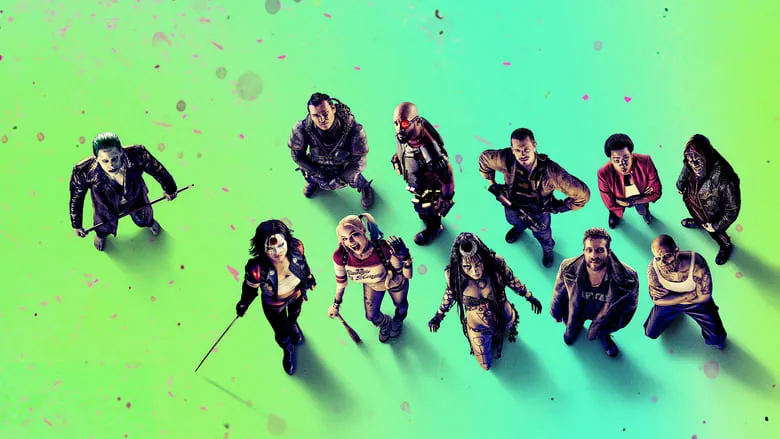
Fun Fact: The role of Rick Flag was originally slated for Tom Hardy, who later withdrew to star in the acclaimed film “The Revenant.”
A Fresh Storytelling Approach in a Familiar Universe
What makes “Suicide Squad” particularly intriguing is its existence within the same cinematic continuum as Zack Snyder’s “Batman v Superman: Dawn of Justice” and “Man of Steel,” with Snyder even credited as a producer. Despite sharing similar stylistic tendencies – notably, a penchant for muted black and metallic blue color palettes – and drawing from the same creative well of behind-the-scenes talent, source material, and even familiar faces (including a memorable cameo by Ben Affleck’s Batman), the film fundamentally diverges in its storytelling methodology.
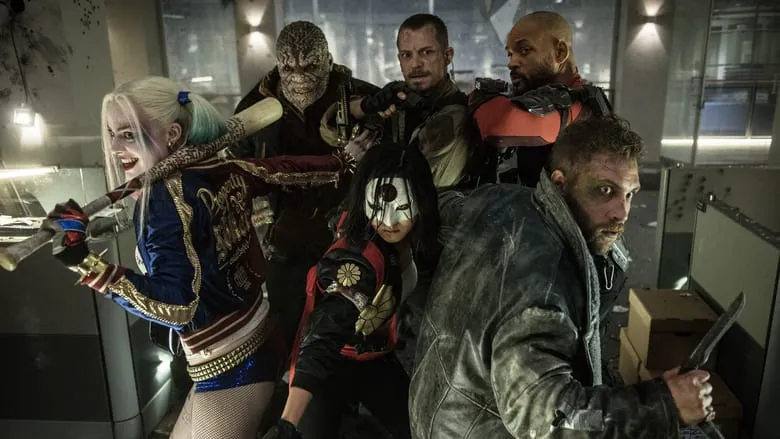
Casting Insight: Before Will Smith ultimately took on the iconic role of Deadshot, a considerable list of A-list actors, including Leonardo DiCaprio, Brad Pitt, and Johnny Depp, were considered.
In stark contrast to the often verbose, ponderous, and grand-scale “Hollywood style” prevalent in Snyder’s superhero endeavors, “Suicide Squad” deliberately embraces a vibrant, pulpy comic-book aesthetic. It communicates through powerful visual expression, striking compositional choices, and dynamic framing, allowing the audience to quickly grasp characters’ emotions and the unfolding situations without lengthy exposition. Dialogue is meticulously trimmed, delivering punchy, witty, and often humor-laced lines that echo the succinct nature of speech bubbles bursting across printed pages. This stripped-down, minimalist stance toward traditional dramatic delivery paradoxically enables the film to convey a much broader and more immediate spectrum of emotions, a feat that Snyder’s more epic comic-book projects frequently struggled to achieve convincingly.
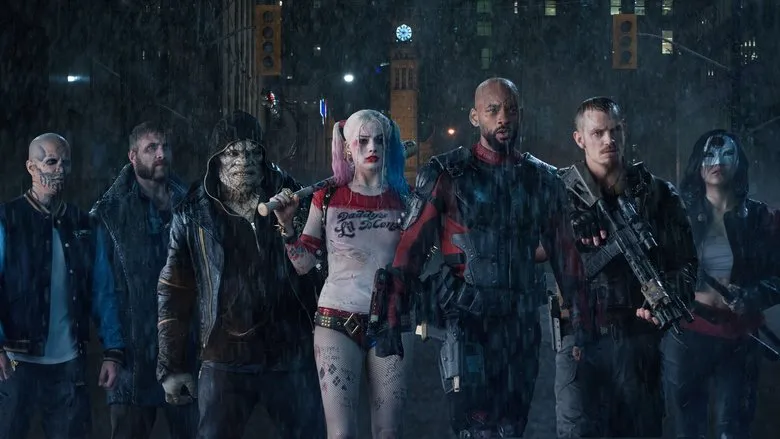
Immersive Sensory Experience
For those who followed the early promotional material, the trailers provided a surprisingly accurate preview of what to anticipate: an overwhelmingly loud, visually arresting, and action-packed spectacle amplified by an eclectic, multi-decade spanning soundtrack, from the rock anthems of Queen to the sharp beats of Eminem. The film is brimming with a continuous stream of visual and verbal gags that punctuate the high-octane narrative. However, while the trailers successfully showcased many of the film’s most dazzling highlights, they, perhaps inevitably, revealed too much, making the viewing experience occasionally predictable. What the pre-release glimpses couldn’t fully convey, though, was the raw, visceral heart of “Suicide Squad,” a pulse that beats rhythmically with every musical note, the satisfying crack of a baseball bat against an enemy, the relentless ricochet of bullets, and even the subtle patter of rain.
An Origin Story with Nuance
At its core, “Suicide Squad” functions as an expansive origin narrative, entrusted with the significant task of introducing a large ensemble of compelling characters within a single film. While the inherent “villainy” of these characters is often softened to make them more palatable for a wider Hollywood audience, each individual is given a compelling, albeit tragic, reason for their incarceration. One character is a master marksman who kills for money, aiming to provide for his beloved daughter; another struggles with uncontrollable, destructive powers; a third endures ostracism and fear due to their unique, formidable appearance; and then there’s the fourth – simply, spectacularly unhinged. Naturally, in such a large ensemble, some characters inevitably find themselves overshadowed (the exact purpose of Jai Courtney’s Australian thug, Captain Boomerang, for instance, remains frustratingly underdeveloped). Yet, the central figures are remarkably well-realized, with Margot Robbie’s Harley Quinn, in particular, being afforded moments of surprising emotional depth and vulnerability that elevate her beyond mere caricature.
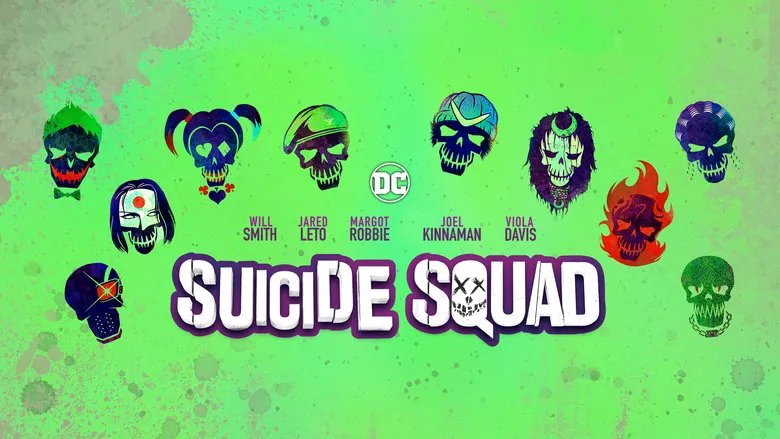
Dynamic Visuals and Standout Performances
Under the precise direction of David Ayer, the film is meticulously constructed using short, fragmented “comic-book panels,” a cinematic technique that effectively simulates the experience of flipping through a graphic novel. This distinctive visual style is made possible by the formidable talents of cinematographer Roman Vasyanov, whose work brings a vibrant, almost tactile graphic quality to every frame, enhancing the film’s unique aesthetic. The cast, too, delivers an array of strong, memorable performances. Will Smith commands the screen with his inherent charisma as Deadshot, the “nominal” villain who, by film’s end, reveals an unexpected heroic streak. However, it is arguably Margot Robbie who truly captivated audiences, delivering a performance of unparalleled energy and unsettling charm as the wonderfully unhinged Harley Quinn.
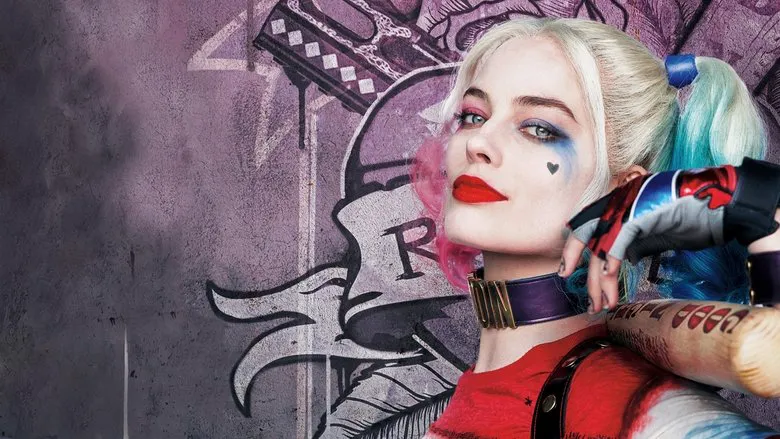
Jared Leto’s Joker: A Disturbing Interlude
Jared Leto’s highly anticipated portrayal of the Joker ultimately manifests as more of an extended cameo than a central role, yet he manages to imprint a uniquely unsettling and unsettlingly original approach onto the iconic villain. This iteration of the Joker consciously deviates from the flamboyant swagger of Jack Nicholson or the anarchic, meticulously planned manic energy of Heath Ledger. Instead, Leto presents a Joker who is a genuinely disturbing, even repulsive, psychopath, seemingly existing within his own twisted, insular world. His intersections with the overarching events of “Suicide Squad” are primarily driven by his obsessive, volatile fixation on Harley Quinn, showcasing a relationship that is as toxic as it is intensely captivating.
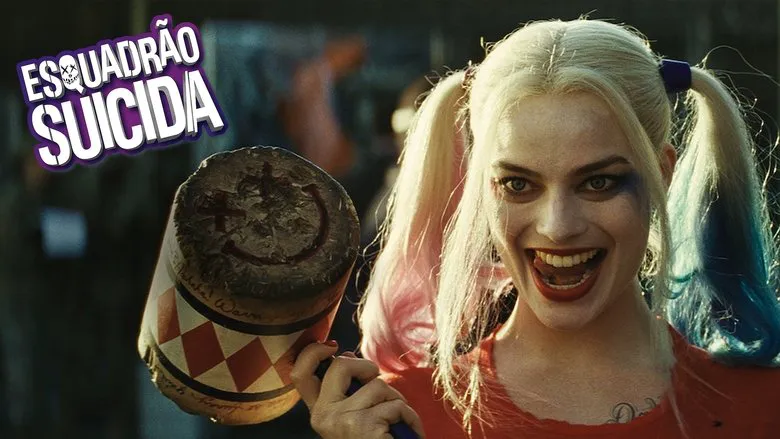
Final Verdict: An Emotional Ride
“Suicide Squad” is a film that ultimately defies conventional cinematic evaluation rubrics. It certainly possesses undeniable flaws: it consciously sidesteps a complex, multi-layered plot, offers minimal in the way of extensive exposition, and eschews profound intellectual depth. The film’s frenetic reliance on rapid-fire quick cuts, coupled with its regrettable descent into more generic superhero tropes during its final act, are evident shortcomings. However, to judge “Suicide Squad” solely on these traditional metrics would be to miss its core strength. If assessed purely on the visceral emotions it successfully evokes, the sheer vibrancy it radiates, and the memorable impact it leaves, “Suicide Squad” emerges as an undeniably spirited, wildly entertaining, and uniquely memorable cinematic experience. It truly is a film that needs to be felt, more than intellectually dissected.